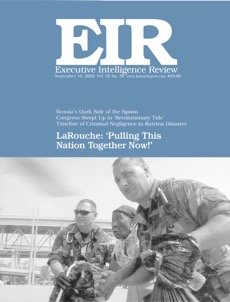LaRouche Webcast: ‘Pulling This Nation Together Now!’
by Lyndon H. LaRouche, Jr.
Lyndon LaRouche gave this webcast address on Sept. 3, fielding questions from Senate offices and others on how to deal with the disaster of Hurricane Katrina, and the imminent threat of a blowout of the global financial-monetary system.
Congress Swept Up in Revolutionary Tide
by Debra Hanania-Freeman
Despite frantic attempts by the Bush Administration to exonerate itself from an avalanche of charges of criminal negligence and malfeasance in the face of the worst domestic disaster in American history, it seems that nothing can stop what Lyndon LaRouche has called the “incoming tide” of a cultural paradigm-shift against the insanity of the Bush-Cheney crowd.
Criminal Negligence: Hurricane Katrina—Actions, Non-Actions
A timeline of warnings from the National Oceanic Atmospheric Administration (NOAA), state governors, and others—which were universally ignored by the Bush Administration.
Bush and Cheney Culpable: Takedown of FEMA, Disaster Planning
Mobilize Public Health Infrastructure Now!
by Christine Craig and Marcia Merry Baker
As emergency health-care workers finally move in and set up temporary treatment centers to deal with hurricane victims, the magnitude of the problem is coming to light.
‘Super-TVA’ Needed, Not Halliburton Profiteering
by Paul Gallagher
Neglected Flood-Control Plans Now Must Be Done
by Richard Freeman
A nation guided by the General Welfare principle will spend 45-50% of its annual investment on the maintenance and upgrading of hard and soft infrastructure. Plans already exist for flood control and water management for New Orleans and the entire Gulf Coast region.
Use Military Bases To House Storm-Displaced
by Carl Osgood
Senators Demand End to Energy Speculation
by Marsha Freeman
Mergers and Energy Prices
International
Zepp-LaRouche Is Shaping Crucial Election in Germany
by Rainer Apel
With prodding from the campaign of BüSo candidate for Chancellor Helga Zepp-LaRouche, incumbent Chancellor Gerhard Schröder finally decided to take up two crucial issues in the election: an economic recovery program, and a categorical “no” to a war on Iran. His attack on those who are speculating on oil prices is particularly significant—if he follows it up with action.
A Dutch Perspective on Battling Terrorism
Interview with Frits Hoekstra.
International Intelligence
Strategic Studies
Obtuse Angles in Post-Soviet Ideology: Russia’s Dark Side of the Spoon
by Lyndon H. LaRouche, Jr.
“When we take into account the very serious, and often globally outstanding accomplishments of Russian and Soviet science, as these are only typified by the work of Mendeleyev and Vernadsky, the influence of certain mystically wild-eyed strains within parts of the Russian intelligentsia today, can only be attributed to some special, exceptional kind of disturbing factor in Russian science, including its Soviet manifestation, a corruption akin to the rampant ‘spoon-bender’ phenomenon familiar to us as among the leading neo-conservatives and assorted religious fanatics in both the United Kingdom and the U.S.A. itself.”
Interview
Frits Hoekstra
Hoekstra is a former officer of the Dutch internal security service, BVD, and the author of In Dienst van de BVD, the first memoir by a Dutch Secret Service officer of his activities working for the service.
Editorial
The Incoming Tide



